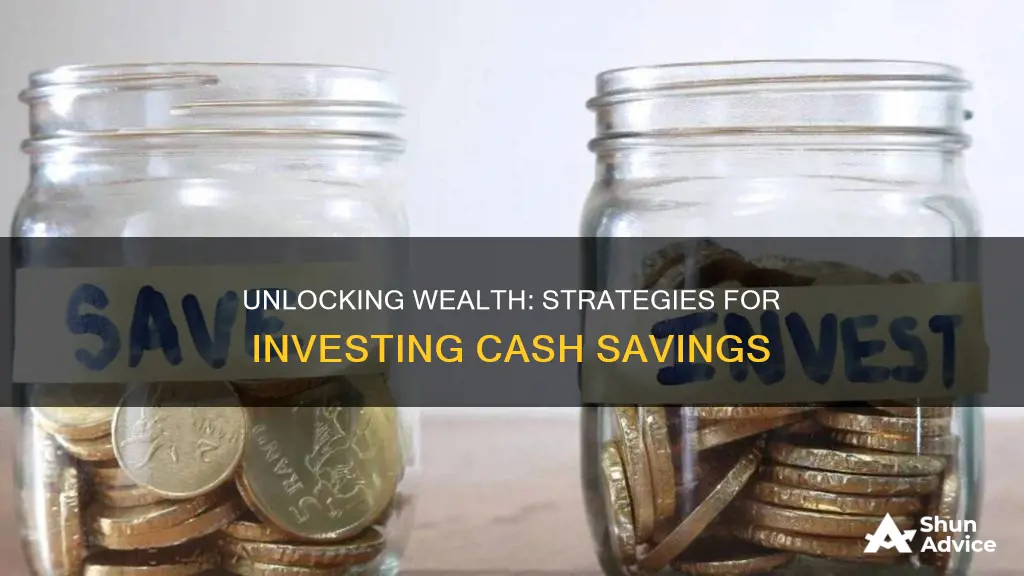
Investing your cash savings can be a great way to build your wealth over time and there are a range of investment options, from safe, lower-return assets to riskier, higher-return ones.
If you're looking to invest, it's important to first identify your financial goals and how much risk you're willing to take on. Generally, the more risk you're willing to take, the higher the potential returns.
Some common investment options include:
- Stocks
- Bonds
- Mutual funds
- Real estate
It's also important to consider the time horizon for your investments. If you're investing for the short term (less than five years), you may want to focus on safer investments such as savings accounts, money market accounts, or short-term bond funds. If you're investing for the long term (more than five years), you can consider riskier investments such as stocks, which have the potential for much higher returns.
Before investing, be sure to do your research and understand the risks and potential returns of each investment option. It's also a good idea to speak to a financial advisor to get personalized advice based on your circumstances.
| Characteristics | Values |
|---|---|
| Time horizon | 3-5 years or more |
| Risk tolerance | High, medium, low |
| Investment options | High-yield savings accounts, long-term certificates of deposit, long-term corporate bond funds, dividend stock funds, value stock funds, small-cap stock funds, rental housing, S&P 500 index funds, Nasdaq-100 index funds, short-term bond funds, cash management accounts, money market accounts, short-term U.S. government bond funds, money market mutual funds, no-penalty certificates of deposit, treasurys |
| Investment goals | Long-term, short-term, retirement, education, vacation, emergency fund, etc. |
| Investment accounts | 401(k), traditional or Roth IRA, taxable account, custodial account, college savings accounts, brokerage account, robo-advisor |
| Investment vehicles | Stocks, bonds, mutual funds, real estate, index funds, ETFs, REITs |
What You'll Learn

High-yield savings accounts
With fewer overhead costs, you can typically earn much higher interest rates at online banks than at traditional brick-and-mortar banks. Plus, you'll likely have easy access to your money by quickly transferring it to your primary bank or via an ATM.
- Capital One 360 Performance Savings Account: This account has no fees or minimums and yields that beat the national average by a wide margin. The Capital One app is great for tech gurus and newbies alike, as it allows for seamless account management, credit monitoring, and savings automation.
- UFB Portfolio Savings: This account offers a competitive APY and has no maintenance or service fees and no minimum deposit. It also offers 24/7 phone support.
- Bask Interest Savings Account: This account has a high APY and lacks hidden fees. There is no monthly fee, minimum deposit requirement, or balance requirement.
- Quontic Bank High Yield Savings: This account is offered by an online bank known for customer service and minimal fees. It offers checking accounts, savings accounts, money market accounts, and CDs. It also provides more ways to get in touch with customer support than the average bank, including text and chat support.
- LendingClub High-Yield Savings: This account offers a variety of funding options, including cash deposits at participating MoneyPass ATMs, bank transfers, wire transfers, and more. It also stands out for offering live chat customer support and a free ATM card.
- Laurel Road High Yield Savings: This account is a competitive savings account with no fees or minimums. The bank also offers equally enticing checking accounts, making it a solid digital option for those looking to bank in one place.
Investing for Retirement: A Conservative Approach to Financial Security
You may want to see also

Long-term corporate bond funds
Investment-grade long-term bond funds often reward investors with higher returns than government and municipal bond funds. But the greater rewards come with some added risk.
You can buy and sell corporate bond funds with any broker that allows you to trade ETFs or mutual funds. Most brokers allow you to trade ETFs for no commission, whereas many brokers may require a commission or a minimum purchase to buy a mutual fund.
- SPDR® Portfolio Long Term Corp Bd ETF
- IShares 10+ Year Invmt Grd Corp Bd ETF
- Vanguard Long-Term Corporate Bd ETF
- Invesco Taxable Municipal Bond ETF
- IShares Core 10+ Year USD Bond ETF
- Vanguard Long-Term Bond ETF
- FlexShares Crdt-Scrd US Lng Corp Bd ETF
Best Asian Investment Spots for Your $100K
You may want to see also

Money market accounts
When choosing a money market account, it is important to consider the annual percentage yield (APY), confirm the availability of check-writing privileges, and ensure that there are no unnecessary fees. It is also worth noting that money market accounts are different from money market funds, which are considered investments and are not insured by the FDIC or NCUA.
- Vio Bank Cornerstone Money Market Account (5.30% APY, $100 minimum deposit)
- Quontic Money Market Account (5.00% APY, $100 minimum deposit)
- Ally Bank Money Market Account (4.20% APY, no minimum deposit)
- Discover® Money Market Account (4.00% APY, no minimum deposit)
Monthly Cash Flow: Exploring Regular-Income Investments
You may want to see also

Short-term US government bond funds
US government bond funds are considered a safer investment option, as investors are confident that the government will not default on its interest or principal obligations. Due to this safety net, these funds generally yield less than riskier securities, but an investor's principal amount remains more secure.
When considering short-term US government bond funds, it is important to pay attention to the fund's expense ratio, or fee, as this will impact your overall returns. Here are some of the top short-term bond funds to consider, along with their SEC yields and expense ratios as of July 2024:
- SPDR Portfolio Short-Term Corporate Bond ETF (SPSB): This fund offers exposure to US corporate bonds with maturities between one and three years. It has an SEC yield of 5.08% and an expense ratio of 0.04%.
- IShares 1-5 Year Investment Grade Corporate Bond ETF (IGSB): The IGSB fund holds bonds issued by major companies like Bank of America, JPMorgan Chase, and Microsoft. It has an SEC yield of 5.11% and an expense ratio of 0.04%.
- Schwab 1-5 Year Corporate Bond ETF (SCHJ): With an SEC yield of 5.11% and an expense ratio of 0.03%, this fund seeks to track the performance of the short-term US corporate bond market.
- Vanguard Short-Term Bond ETF (BSV): The BSV fund holds government bonds, high-quality corporate bonds, and international dollar-denominated bonds. It has an SEC yield of 4.61% and an expense ratio of 0.04%.
- Fidelity Short-Term Bond Fund (FSHBX): Aiming to produce a high level of current income, this fund typically invests at least 80% of its assets in investment-grade debt with an average maturity of three years or less. It has an SEC yield of 4.77% and an expense ratio of 0.30%.
While short-term US government bond funds are a relatively safe investment option, they are not entirely risk-free. Investors seeking even lower-risk options may consider money market funds.
The Salem Investment Partners' Journey with Will Johnson
You may want to see also

No-penalty certificates of deposit
- CIT Bank: 3.50% APY for an 11-month CD with a $1,000 minimum deposit
- Marcus by Goldman Sachs: 4.70% APY for a 7-month CD, an 11-month CD, or a 13-month CD with a $500 minimum deposit
- Ally Bank: 4.00% APY for an 11-month CD with no minimum deposit
- Climate First Bank: 5.34% APY for a 6-month CD or 5.00% APY for a 1-year CD with a $500 minimum deposit
- Bank of America: 4.25% APY for a 1-year CD with a $1,000 minimum deposit
It's important to note that no-penalty CDs typically don't allow partial withdrawals, so if you decide to withdraw your money early, you'll likely have to withdraw your entire balance and close the account. Additionally, no-penalty CDs may offer lower interest rates than standard CDs.
Wisdom Tree Investments: Unlocking Growth Through Dividends
You may want to see also
Frequently asked questions
Some short-term investment options include high-yield savings accounts, money market accounts, cash management accounts, and short-term bond funds.
Some long-term investment options include stocks, bonds, mutual funds, and real estate.
When investing for the short term, it's important to set realistic expectations, focus on safety over returns, and pick investments that align with your needs.
The amount of cash you should keep in the bank depends on your financial situation and budget. It's recommended to keep enough to cover regular bills, discretionary spending, and an emergency fund.
To start saving money, it's recommended to set up small automated deposits, spend less than you earn, and develop a budget to ensure your expenses are less than your income.







